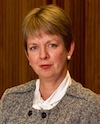Session Coordinator: Feng Shenghao
Climate Change is a defining challenge for the global community in the 21st Century, so what are Australia and China’s role in it? Australia and China are both vulnerable to climate change, yet they both have large cities along there coastlines and are susceptible to suffer great loss from increasing heat waves, droughts and floods. Moreover, Australia and China are key contributors towards climate change. Australia’s energy consumption and Co2 emissions are also high in per capita terms and China’s are high in absolute terms. The two countries are responsible for climate change chiefly through the extensive use of carbon-intensive energy, especially coal.
Luckily, Australia and China are also two countries with enviable renewable energy resources, but how can they take advantage of such endowments? Moreover, Carbon pricing is a tool that promises the most cost-effective way of emissions abatement; both Australia and China may use it to internalize the externality, so what are the mechanisms fundamental to a carbon market? Climate change is also a global problem, so what are Australia and China’s roles in the international climate framework?
Taking these questions into account, in this session, we will explore the follow issues of climate change:
- The Science
- Our Energy Options and Future
- The Renewable Energy Market
- The Economics of Carbon Pricing
- The International Framework.

Professor Kenneth Baldwin
Deputy Director, Research School of Physics and Engineering; and Director, ANU Energy Change Institute
Professor Ken Baldwin is a laser physicist based at the Australian National University, where he is Director of the ARC Centre of Excellence for Quantum-Atom Optics, Director of the ANU Energy Change Institute, and Deputy-Director of the Research School of Physics and Engineering.
Professor Baldwin is a Fellow of the Australian Institute of Physics, The Institue of Physics (UK), the Optical Society of America and the American Physical Society. He is a past-President of the Australian Optical Society, and is the first Australian to be elected to the Board of Directors of the Optical Society of America. In 2007, Professor Baldwin was awarded the W.H. Beattie Steel Medal, the highest honour of the Australian Optical Society, and in 2010 he was awarded the Barry Inglis Medal by the National Measurement Institute for excellence in precision measurement.
Professor Baldwin is also a past-President of the Federation of Australian Scientific and Technological Societies (FASTS). In 2004 he won the Australian Government Eureka Prize for Promoting Understanding of Science, for his role in initiating and championing “Science meets Parliament”.

Ian Fry
International Environmental Law and Policy Expert
Ian Fry is an international environmental law and policy expert. His focus is primarily on the mitigation policies associated with the UN Framework Convention on Climate Change and its related agreements. He actively participates in climate change negotiations as a member of the delegation of the Government of Tuvalu. He also participates in other international environment fora, including the Convention on Biological Diversity. His particular interest relates to land use change and forestry issues with the Kyoto Protocol and the interface between science and policy making.
Ian Fry works as the International Environmental Officer for the Environment Department of the Government of Tuvalu. He has held this position for over twelve years and has represented the Tuvalu Government in numerous international fora including the World Summit on Sustainable Development, Commission for Sustainable Development, UN Framework Convention on Climate Change (UNFCCC) and the Kyoto Protocol, Convention on Biological Diversity, and United Nations General Assembly. Ian is the spokesperson for the Alliance of Small Island States on matters relating to land use, land use change and forestry and more generally on issues relating to mitigation in the consideration of future climate change regimes. He has held the position of Vice-Chair of the Facilitative Branch of the Compliance Committee under the Kyoto Protocol.
Ian also undertakes consultancy work primarily associated with negotiations training in the context of multilateral environmental agreements. His work focuses on building the capacity of government representatives from Least Developed Countries (LDCs) and Small Island Developing States. He has facilitated negotiations training workshops in the Cook Islands, Federated States of Micronesia, Fiji, the Marshall Islands, Nepal, Samoa, Senegal, Solomon Islands, Timor Leste, Tuvalu, Vietnam as well as special pre-Conference of Party workshops for LDCs in Canada, Italy, Indonesia, Kenya and Thailand. This work is carried out in association with the Foundation for International Environmental Law and Development (UK), the United Nations Environment Programme, the United Nations Development Programme, WWF Pacific and the Secretariat of the Pacific Regional Environment Programme.
Prior to working for the Tuvalu Government, Ian was a writer for Earth Negotiations Bulletin. He has been a long term member of the IUCN Commission on Environmental Law and is the current Pacific Regional representative to the United Nations for the International Council on Environmental Law. He is currently undertaking a part-time doctorate through the Fenner School of Environment and Society (ANU) looking at land use change and forestry issues under the UNFCCC and the Kyoto Protocol.

Professor Stephen Howes
Director, Development Policy Centre; Director, International and Development Economics Professor of Economics
Prior to joining the Crawford School in 2009, Stephen was Chief Economist at the Australian Agency for International Development. He worked from 1994 to 2005 at the World Bank, first in Washington and then in Delhi, where he was Lead Economist for India. In 2008, he worked on the Garnaut Review on Climate Change, where he managed the Review's international work stream.
Stephen serves as a Board Member for CARE Australia. He has previously served on the Board of the Pacific Institute of Public Policy, and on the Advisory Council of the Asian Development Bank Institute. He is the Director of the Development Policy Centre, as well as the International and Development Economics teaching program at the Crawford School.

Associate Professor Janette Lindesay
Professor of Climatology
Associate Professor Janette Lindesay's principal research interests are in climate variability during the period of instrumental record, and climate change science in relation to vulnerability and adaptation. Her current research focuses on integrating multiple influences on low-frequency fluctuations in Australian rainfall, including the potential for deterministic and dynamical seasonal forecasting; climatological aspects of bushfires and drought in Australia; temperature and rainfall trends and extremes; and climate change adaptation. She is also engaged in research into the pedagogy of climate change in academic and professional education.
Janette obtained her Honours degree in Geography, Postgraduate Teaching Diploma and Doctorate in statistical and dynamical climatology from the University of the Witwatersrand in Johannesburg, and has also worked in academic and research organisations in South Africa, the UK and Australia. She has chaired the Atmosphere Reference Group for the ACT Region State of the Environment Report, and is a former President of the Canberra branch of the Australian Meteorological and Oceanographic Society. In addition to convening and teaching academic and professional programs and courses in climate science and climate change science and policy at the ANU, Janette teaches by invitation at the United Nations University in Tokyo, is a member of a number of professional meteorological societies, and is on the editorial boards of two international journals.

Alex Wyatt
Founder, Climate Bridge
Alex Wyatt co-founded Climate Bridge in the living room of his Shanghai apartment in 2006, and as CEO, grew the company into a multi-national enterprise which became one of the world's leading players in the international carbon markets. By 2013, Climate Bridge had a portfolio of more than 160 clean energy projects across China spanning a wide range of technologies including hydro-electricity, wind, biomass, solar, biogas, waste heat capture and other forms of energy efficiency. Taken together, Climate Bridge's projects comprise more than 2 GW of clean energy infrastructure and reduce so many emissions that they essentially make the whole country of Mongolia carbon neutral every year. In 2013, Alex sold the Climate Bridge business to an Asian consortium, and now spends his time as a Board Member of a number of different environmental business companies, as the Deputy Chair of the Rhodes Scholarship Selection Committee in Victoria, and on a range of non-profit activities, most notably in the education and disability sectors in Australia.
Prior to founding Climate Bridge, Alex spent a number of years in the Shanghai office of McKinsey & Company, where he worked with both state-owned and multinational enterprises all over China. He is also an expert on the Chinese transportation sector, having undertaken a number of different projects to help optimise rail, sea and trucking networks throughout the country. From 2008-09, Alex was also a member of the Advisory Board of GECKO, an environmental education NGO based in Shanghai, and was a lead fundraiser for the Shenyang Children's Village in Liaoning Province, China, from 2002-04. Prior to moving to China, Alex was an overseas professional cricket player for Cranleigh Cricket Club in the UK (1998) and was a 1st grade cricketer in the Victorian Premier League from 1997-2000.
Alex was recently appointed by the World Economic Forum as one of its Young Global Leaders, and in 2009, was named in the "Advance Asia 50" as one of the fifty most influential Australians living in Asia. Alex was educated at Melbourne University (B.Sc, LLB) and Oxford University (M.Phil, MBA), where he was a Rhodes Scholar.
Suggested Readings:
- Ross Garnaut (2011), 'Chapter 1: Beyond Reasonable Doubt', in The Garnaut Review 2011: Australia in the Global Response to Climate Change, available from: http://www.garnautreview.org.au/update-2011/garnaut-review-2011/chapter1.html
- Nicholas Stern (2008), 'The Economics of Climate Change', American Economic Review, 98(2): 1-37, available from: http://www.aeaweb.org/articles.php?doi=10.1257/aer.98.2.1
- Ross Garnaut (2013), 'National Contributions to the Global Mitigation Effort: Issues for Australia and China', available from: http://www.rossgarnaut.com.au
- Shenghao Feng (2013), 'Emissions trading in China: risky, difficult, but necessary', The Conversation, available from: http://theconversation.com/emissions-trading-in-china-risky-difficult-but-necessary-13891
- The Economist (2013), 'Can China clean up fast enough?', available from: http://www.economist.com/news/leaders/21583277-worlds-biggest-polluter-going-green-it-needs-speed-up-transition-can-china
- Frank Jotzo and Yongsheng Zhang (2013), 'China’s climate change policy: greener growth?', East Asia Forum, http://www.eastasiaforum.org/2013/03/04/chinas-climate-change-policy-greener-growth/
NB: More speakers will be detailed in the coming weeks. Coal-fired Power Plants, Shaxi; image courtesy of Natalie Behreng via Flickr.


